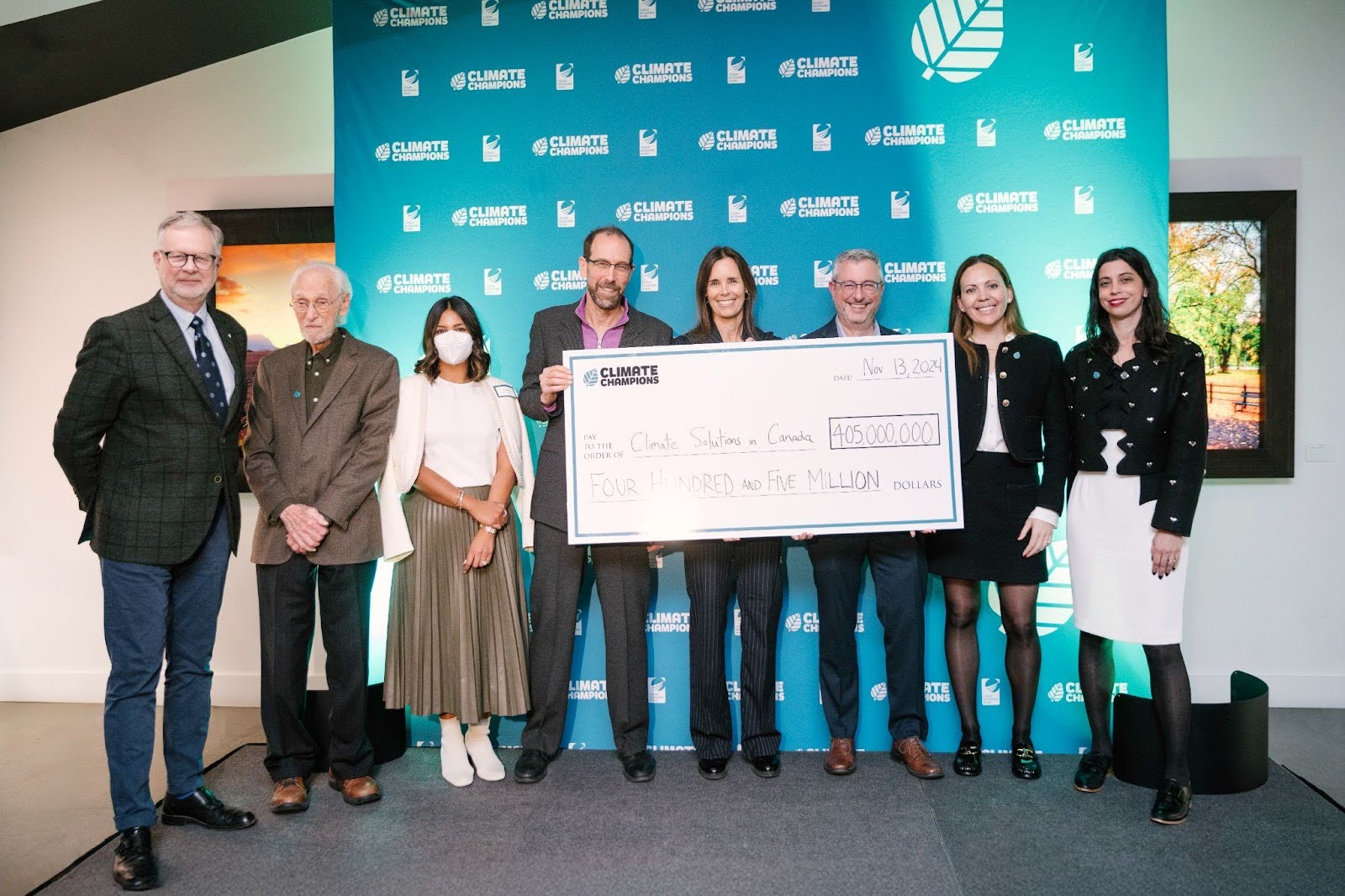Nine Canadian funders make historic $405 million pledge to combat climate change
Why It Matters
Climate change is an existential threat. Yet climate solutions get just a fraction of philanthropic dollars. Could a new pledge help motivate others to give more?

With the United Nations’ latest climate change convention (COP29) underway in Azerbaijan, nine Canadian funders have made environmental history with a $405 million pledge to combat climate change.
Over the next decade, participating funders will distribute the philanthropic capital to various non-profit groups to help protect the environment.
The Climate Champions initiative, facilitated by the Clean Economy Fund, is the largest-ever collective pledge of philanthropic capital to combat climate change in Canadian history, according to organizers.
“The urgency of the climate crisis was really calling for immediate and bold action,” said Éric St-Pierre, executive director of the Trottier Family Foundation, which pledged $150 million toward climate change solutions as part of the initiative.
“We feel that this is a pivotal moment in history. We’ve got a very limited window to meet this once-in-a-generation challenge.”
Pledged funds will be distributed by participating funders directly rather than pooled and granted together, said St-Pierre.
Like the Trottier Family Foundation, some organizations participating in the pledge have funded climate solutions for years.
The Peter Gilgan Foundation, which pledged $100 million over ten years, has previously supported the World Wildlife Foundation, the David Suzuki Foundation, and Environmental Defence.
The $405 million pledge tally includes a re-commitment by the Ivey Foundation, a longstanding environmental funder, to distribute $100 toward climate-focused projects as part of its spend-down.
Some pledge funders are newer to the space, however.
Established in 2022, the Ronald S. Roadburg Foundation, a Vancouver-based family foundation, pledged $18 million.
The Toronto-based Vohra Miller Foundation launched just four years ago and pledged $5 million over ten years.
The total commitment also includes pledges from the Chisholm Thomson Family Foundation ($10 million), David Keith and Kirsten Anderson ($6 million), the Sitka Foundation ($5 million), and Allan Shiff ($1 million).
‘Climate change is already here’
St-Pierre said the motivation for Climate Champions was to increase the number of high-net-worth Canadians and family foundations fighting climate change with their philanthropy.
While the country’s four philanthropic associations have worked together for several years to try to increase environmental funding, he said Canadian philanthropic support for combatting climate change remains below the global average.
Nationally, less than one per cent of philanthropic capital is climate-focused, according to estimates by the Clean Economy Fund.
Globally, that figure is closer to two per cent, according to a report by the ClimateWorks Foundation.
This dearth of funding is a problem because climate change is here, and climate-based solutions providers need additional capital, said Devika Shah, Environment Funders Canada executive director.
“We are facing an existential crisis,” she said. “Every tenth of a degree matters.”
Philanthropy can offer ‘catalytic capital’
The good news is that despite the scale of the crisis, philanthropy has a unique and significant role to play, said St-Pierre.
While the government can provide much more funding overall, philanthropy can act more nimbly and spur additional investment by others.
St-Pierre said that the Trottier Family Foundation has seen this firsthand.
In the late 2010s, the foundation granted about $400,000 to support The Atmospheric Fund (TAF), a Toronto-based environmental funder, and to initiate the creation of the Low Carbon Cities Canada (LC3) initiative, which aimed to create TAF-like funders in cities across the country.
Seeing the model’s success in Toronto, the federal government committed $183 million to support the effort.
LC3 funds are now active in seven Canadian cities: Vancouver, Halifax, Ottawa, Calgary, Edmonton, Toronto and Montreal.
St-Pierre said he’s hopeful such examples will inspire others.
“We need philanthropy to start de-risking innovative projects, unlocking additional funding and mobilizing action,” he said.

Lauren Castelino, founder of Green Career Centre, a youth-led ecological non-profit, said she was glad to see funders working together to bring more money into the sector.
However, she said she was disappointed that pledge participants did not take the opportunity to additionally commit to using their climate-focused dollars to support youth and BIPOC-led environmental solutions.
As part of the research for her master’s degree, Castelino interviewed ten racialized youth climate justice activists. They said they have faced considerable barriers to securing stable funding for their work, including restrictive grant conditions.
Funding grassroots solutions isn’t just about equity but will also support funders in advancing systemic change, said Castelino
A drop in the ocean?
Though the pledge has started with nine funders, St-Pierre and co-organizers hope there will be many more.
With the support of Climate Champions, the Clean Economy Fund aims to triple Canadian philanthropy from about $100 million to more than $300 million per year by 2030.
In support of that effort, Shah said she wants wary funders to understand that though the problem might feel insurmountable, every contribution matters.
“It is a drop in the ocean, but we need every drop,” she said.
